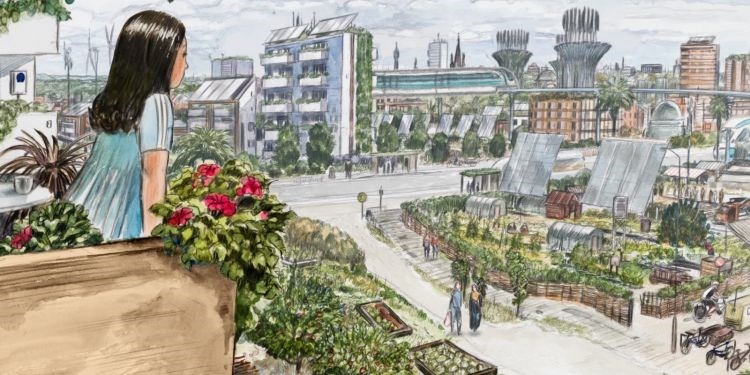No One is an Island is an animated documentary short film created by David Bunting and James McKay and is a finalist in the MY HERO 2025 Film Festival.
 Still from FilmDavid Bunting and James McKay
Still from FilmDavid Bunting and James McKay
In the film, through an animated conversation, scientists explore if everyone can live well without harming the environment and reveal how hope and creativity can inspire change. Through creativity, research, and collaboration, the film shows that a better, sustainable future is possible—and it’s closer than we think.
The film is the brainchild of James McKay, manager of the Centres for Doctoral Training in Low Carbon Technologies, Bioenergy, and Water-WISER at the University of Leeds, and James McKay, manager of Centres for Doctoral Training (Low Carbon Technologies, Bioenergy and Water-WISER) in the Faculty of Engineering & Physical Sciences, not only contributed to the story but also created the illustrations that bring the research to life.
McKay contributed to the story and created the illustrations for the film and Bunting who produced and directed the documentary, alongside a team of animation professionals.
In the film, the animated conversation features voices from the Sustainability Research Institute—alumni Julia Steinberger, Joel Millward-Hopkins, Jefim Vogel, and Martha Baltruszewicz. James was also supported by PhD researchers Hannah Robinson, Angela Bayona, and Spurthi Kolipaka from the School of Civil Engineering, who gave feedback and guidance on the artwork.
The documentary is based on the Living Well Within Limits project, led by Professor Julia Steinberger and supported by a Leverhulme Research Leadership Grant. This research asked: What do humans really need to live well—and how can we achieve this with fewer resources?
The findings are both surprising and inspiring: even with a global population of ten billion, humanity could thrive while using far less energy and fewer resources than today.
Professor Steinberger explains:
“We are presented with a false narrative focused on the endless pursuit of the good life; we are told the only way to stop climate change is to give up our quality of life. This is the story of our research challenges.”
By teaming up with David Bunting and James McKay, the researchers found a way to share these ideas beyond academia—through the power of animation and storytelling, bringing the research to a wider audience.
Director David Bunting describes the film as a reminder of “the power of love, courage, and creativity to spark positive change.”
James McKay sees the film as a vital tool for hope:
“We’re surrounded by doom and gloom stories about climate change, but there is still time to transition to a better future. The only problem is that we have very few visions of that future to inspire people in a positive way.
This film is vitally important because it combines science with art—to make an emotional connection and inspire people to realise that change is achievable.”
No One is an Island is the latest in the partnership between James and David. Their earlier work, Dreams of a Low Carbon Future, imagined Yorkshire 100 years from now as a thriving zero-carbon society. The new film continues this mission: to share visions of a hopeful future where humans and the planet can flourish together.
Watch the film here: myhero.com/no-one-is-an-island
About the MY HERO International Film Festival:
The My Hero Film Festival is an annual event dedicated to showcasing films that celebrate the power of the human spirit. Thanks to generous sponsors, prizes are awarded to elementary, middle school, high school, college and professionals in a variety of categories including documentary, narrative, music video, animation, experimental, and more.
The festival aims to inspire audiences to recognize the heroism in their own lives and encourage positive actions in their communities. Learn more.
Page created on 10/2/2025 4:10:57 PM
Last edited 10/2/2025 4:54:40 PM
